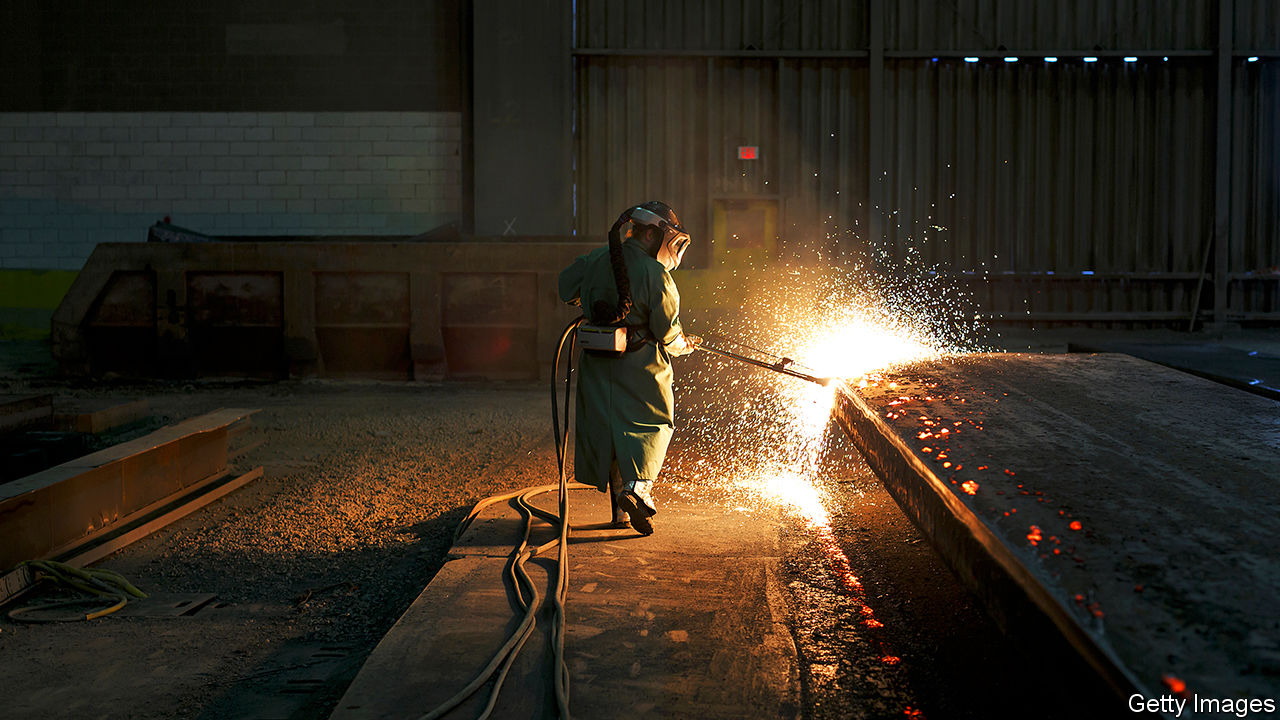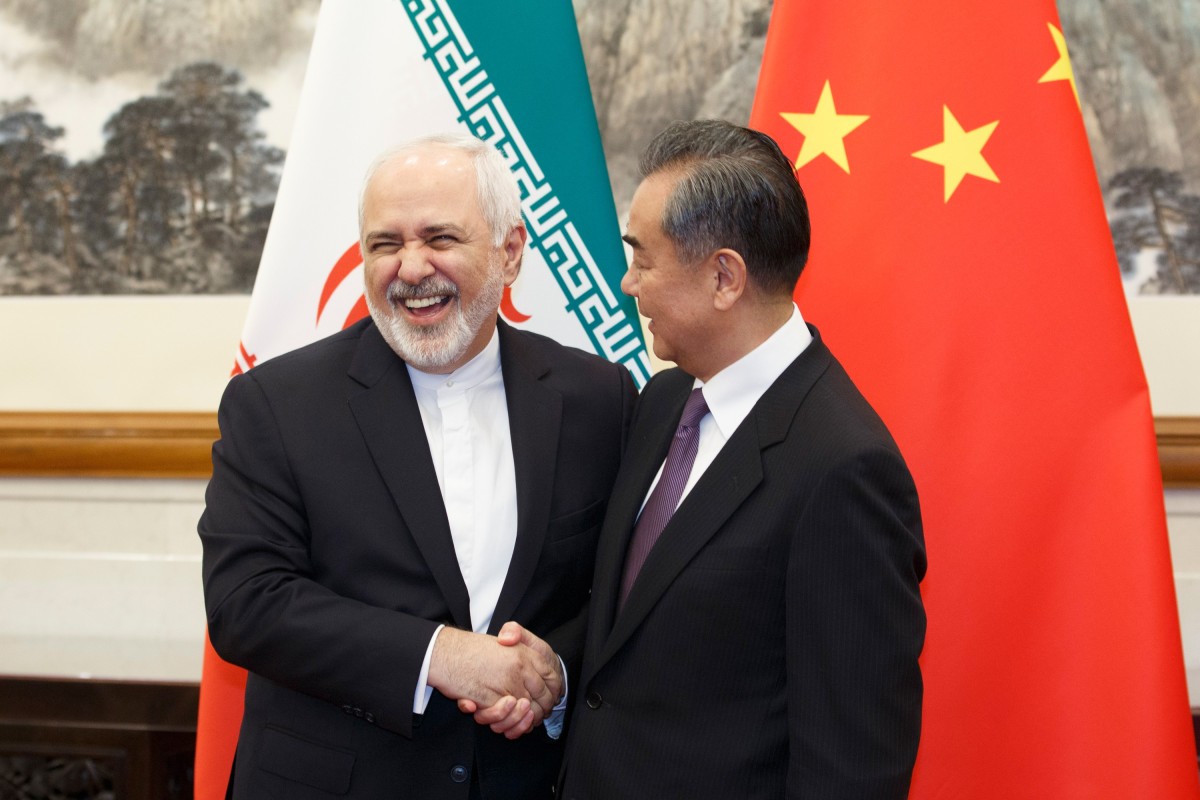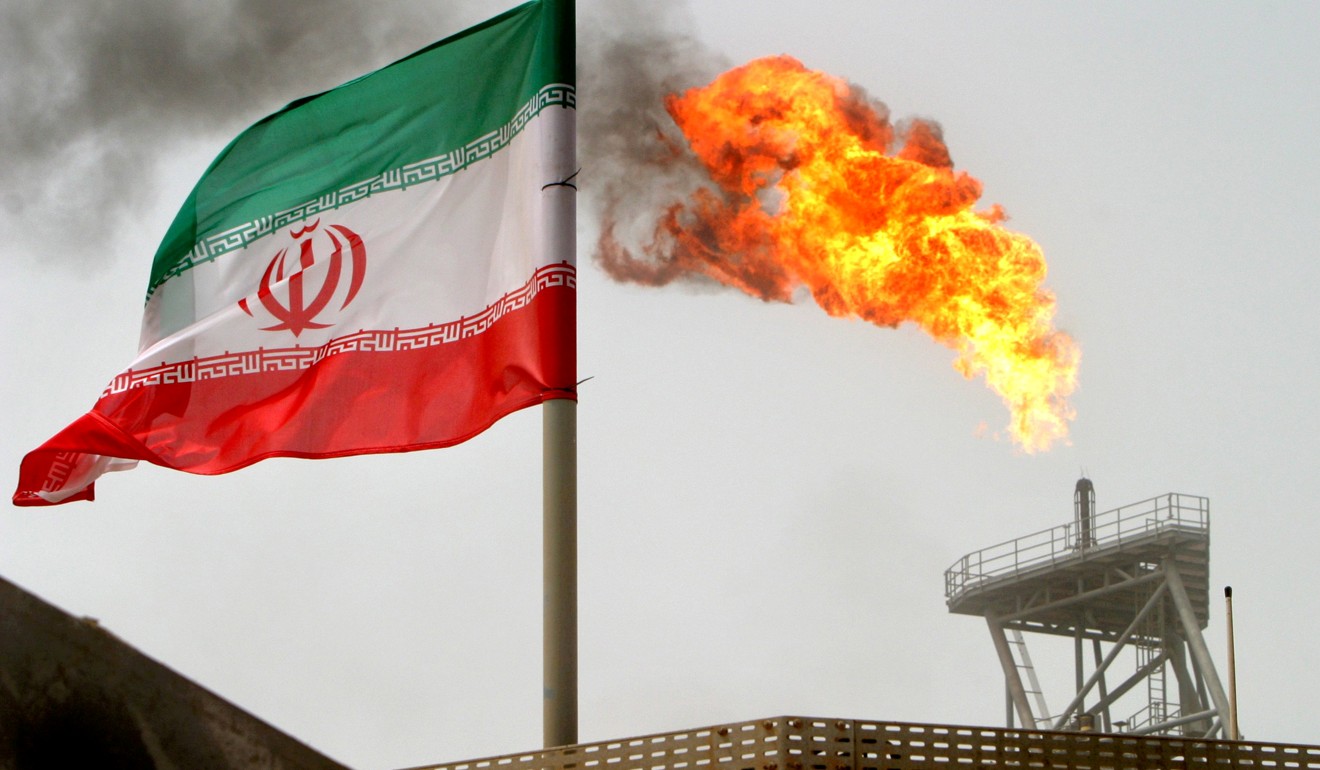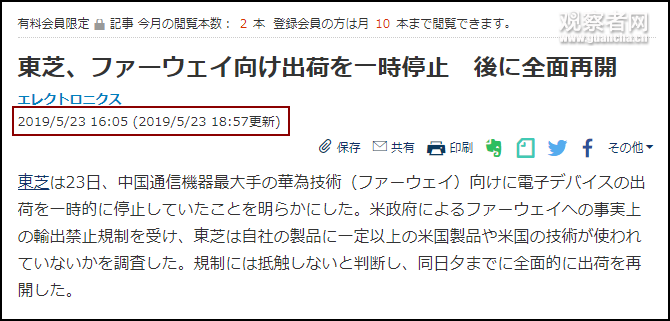- Joined
- Nov 29, 2016
- Messages
- 5,674
- Points
- 63
https://www.rt.com/business/460059-trump-tariffs-canda-mexico/
End of Trump’s tariff game with Canada & Mexico sends warning signal to ‘high-risk adversary’ China
Published time: 23 May, 2019 07:15
Get short URL

A sign near the United States border post into Canada © Reuters / Lucy Nicholson
Washington announced its decision to remove tariffs on steel and aluminum imported from Canada and Mexico, effective on Monday, in an effort to boost ratification of a new trade deal to replace NAFTA, known as the United States-Mexico-Canada Agreement (USMCA).
Initially tearing apart the old deal and imposing tariffs was just “political theatre” to gain internal political support, Richard Wolff, a professor emeritus of economics at the University of Massachusetts, told RT.
Read more
 China's other nuclear option in trade war with US – Rare earth materials
China's other nuclear option in trade war with US – Rare earth materials
“It was a way to show Mr. Trump is a warrior of American interests, it portrayed Mexico and Canada as taking advantage of the United States,” Wolff said, adding that the reality is that every White House administration for the last 200 years managed to have mutually beneficial relationships with its northern and southern neighbors.
“The decision to end the tariff is most likely due to the need to focus on the trade war with China and to get the new trade agreement with Canada and Mexico ratified,” former managing director and CEO of International Strategic Alliances, George Koo, wrote in an emailed comment.
Apart from a step toward the new trade deal with the two countries, the latest Trump decision indicates that steel and aluminum are strategically important industries “that can’t be outsourced to high risk adversaries” like Beijing, according to Jack Worthington, managing partner at Arundel & Co.
“It is a strong signal that the Trump administration believes the trade war/adversarial relationship with China is long term and won’t be resolved anytime soon. It’s an admission of irreconcilable trade and geopolitical differences with China,” the analyst said.
There is one thing similar in the tariffs imposed by the US on Canada, Mexico, and China, and that is the fact that they are used as an excuse for Washington’s domestic problems, according to Wolff.
Also on rt.com ‘Stupid economics’: Attack on Huawei tells world to avoid doing business with US - Prof. Wolff
“What is similar, is the attempt by the US government to enforce a few changes on the trading partners. This is part of the idea that the problems of the American economy has something to do with foreigners,” the professor told RT, adding that US capitalism is obviously in trouble.
The removal of duties on metals can actually take some of the pressure off US consumers, Peter Earle from American Institute for Economic Research noted.
Also on rt.com Huawei has long been ready for US ban & won’t bow to pressure, CEO says
“Canada and Mexico may now be able to, and be in a position to, supply the US with some of the steel, aluminum, and/or other goods which tariffs on Chinese imports have made much more expensive,” the researcher explained.
Meanwhile, former CEO George Koo stressed that ending tariffs on the two US neighbors might have little impact on the trade war with China because the situation will worsen anyway due to the Trump administration’s actions.
For more stories on economy & finance visit RT's business section
https://www.economist.com/finance-a...om-canada-and-mexico-gain-relief-from-tariffs
Topics
Current edition
More
Subscribe
Log in or sign upManage subscription
Shining brighterAmerican importers of metals from Canada and Mexico gain relief from tariffs
But the overall direction is still towards protectionism

Print edition | Finance and economics
May 23rd 2019 | OTTAWA AND WASHINGTON, DC
TIMES HAVE been tough for Riverdale Mills Corporation, a company based in Northbridge, Massachusetts. In June last year the Trump administration imposed tariffs of 25% on steel imported from Canada, which accounted for half the firm’s supply. As its business involves transforming steel rods to supply 85% of North America’s lobster traps, and 31 miles (50km) of security fencing along America’s border, its costs soared. “We were very, very disappointed,” said James Knott, its chief executive.
Disappointment has given way to delight. On May 19th President Donald Trump declared that steel and aluminium from Mexico and Canada no longer posed a threat to America’s national security, and the next day the tariffs were no more. “This is just pure good news for Canadians,” said Justin Trudeau, Canada’s prime minister.
Get our daily newsletter
Upgrade your inbox and get our Daily Dispatch and Editor's Picks.
It was also excellent news for American consumers of steel. Faced with a lack of steel of similar quality from American suppliers nearby, and the expense of shipping from those farther away, Mr Knott had stuck with his Canadian suppliers, which hit profits and forced him to trim his workforce. Although he kept prices steady for his core products, some customers decamped anyway, worried that price rises were coming.
The tariff cuts will relieve strain for metal importers immediately. But the effect on the overall market may be muted, says Michael Widmer of Bank of America Merrill Lynch, an investment bank. Before the tariffs Canada and Mexico supplied only around 15% of America’s combined steel and aluminium imports. Most of the rest still faces trade restrictions. For steel the relief will be “very narrow”, he says.
Even that narrow relief will leave trade between the United States and its North American neighbours less free than before. The deal between the United States, Canada and Mexico allows for tariffs to be reimposed without notice if imports of a particular product surge. And it includes new, as yet unspecified, enforcement provisions, intended to ensure that metal from other countries does not sneak into the United States. That is meant to address concerns about Chinese exports depressing American prices through the back door.
But it is better for Canada and Mexico than the quotas the Trump administration had been demanding. Those could have blocked trade altogether, even if American supply had fallen short. And the deal’s political significance goes well beyond the limited quantities of metal imports it covers. Mr Trudeau called it a “big step forward” towards ratifying the USMCA, the deal between the United States, Canada and Mexico negotiated to replace NAFTA. Though Democrats in Congress are likely to demand further changes first, its chances should be helped by the silencing of Canadian and Mexican complaints.
The news does not mean that Mr Trump is no longer, as he put it, a “tariff man”. On May 17th a presidential proclamation gave Japan and the European Union up to six months to negotiate away the (imaginary) threat posed by their cars and car parts to America’s national security. On May 10th American tariffs on $200bn of Chinese imports increased from 10% to 25%. All this means Mr Knott’s luck has turned. As he points out, all tariffs are “an exploitation of the consumer”. But now it is not his firm that is feeling the worst of the squeeze.
This article appeared in the Finance and economics section of the print edition under the headline "Shining brighter"
Print edition | Finance and economics
May 23rd 2019 | OTTAWA AND WASHINGTON, DC
Reuse this content
About The Economist
https://www.brewbound.com/news/us-lifts-aluminum-and-steel-tariffs-on-canada-mexico
US Lifts Aluminum and Steel Tariffs on Canada, Mexico
Tweet
Reddit
Share
Share
Email

Nearly a year after imposing aluminum and steel tariffs against Canada and Mexico, the Trump administration today officially lifted levies imposed upon the two longtime trade allies.
On Friday, President Donald Trump announced plans to remove the tariffs — 25 percent on foreign steel and 10 percent on imported aluminum — as the three countries work toward the passage of a renegotiated North American Free Trade Agreement (NAFTA), now called the U.S.-Mexico-Canada Agreement. In turn, Canada and Mexico today lifted retaliatory tariffs against U.S. goods.
Ending tariffs on steel and aluminum imported from Canada and Mexico marks a significant moment for the beer industry, as about 43 percent of aluminum used by U.S. beverage companies comes from Canada, according to Washington, D.C.-based trade group the Beer Institute (BI).
Nevertheless, BI president and CEO Jim McGreevy said tariffs on aluminum and steel, which amount to a $350 million annual tax on the industry, need to be completely repealed.
During a wide-ranging panel discussion at Brewbound’s Brew Talks meetup, held last Friday in Washington, D.C., McGreevy called the exemptions for Canada and Mexico “a good start.” However, he said potential price irregularities already exist as beer companies have been overcharged for aluminum cansheet made mostly of scrap metal.
“We need to engage policymakers in a discussion — which we’re already doing — about the goofiness of how aluminum is priced and get that changed,” he said.
In a message to BI members on Friday, McGreevy wrote that beverage makers have been paying “a tariff-loaded Midwest Premium (MWP)” — the full logistical costs of shipping and storing the metal in the U.S. — on metal and cansheet made with 70 percent scrap.
“As long as this practice continues, it’s impossible to say if things will get better for American brewers, who need certainty and stability to compete,” he wrote.
This past March, the BI tapped Austin, Texas-based Harbor Aluminum — a research firm that specializes in the global aluminum industry – to study and estimate the cost of aluminum tariffs under section 232 of the Trade Expansion Act of 1962 since they were imposed on March 2018. Harbor found that the U.S. beverage industry paid about $250 million for aluminum cansheet between March and December. During the same period, however, the United States Department of the Treasury collected just $50 million, while U.S. smelters and rolling mills pocketed the rest.
Although President Trump has eased the tariffs on imported goods from Canada and Mexico, he has also escalated his trade war against China by increasing levies against $200 billion worth of Chinese goods. As such, the tariffs on several products being imported from China, including brewing equipment, have increased from 10 percent to 25 percent. In turn, China has threatened to raise its tariffs on $60 billion of U.S. goods beginning in June.
Leaders with the BI and the Brewers Association (BA) said they plan to file objections with the administration during a comment period that will remain open through mid-June. Paul Gatza, BA senior vice president, also suggested that brewers file comments with the administration.
“If you’re thinking about getting any brewing machinery from China, you should probably file a comment,” he said during the Brew Talks event.
McGreevy added that trade groups need to continue to advocate for changes and educate the Trump administration on the impact tariffs have on the brewing industry.
“There’s not going to be any end in sight for this, at least in the long-term. In the short-term, we do know that these newly revised exemption for Canada and Mexico on steel and aluminum says they’re at least open to listening a little bit,” he said. “So that’s a good thing. You just have to keep at them.”
End of Trump’s tariff game with Canada & Mexico sends warning signal to ‘high-risk adversary’ China
Published time: 23 May, 2019 07:15
Get short URL
A sign near the United States border post into Canada © Reuters / Lucy Nicholson
- 416
- 1
Washington announced its decision to remove tariffs on steel and aluminum imported from Canada and Mexico, effective on Monday, in an effort to boost ratification of a new trade deal to replace NAFTA, known as the United States-Mexico-Canada Agreement (USMCA).
Initially tearing apart the old deal and imposing tariffs was just “political theatre” to gain internal political support, Richard Wolff, a professor emeritus of economics at the University of Massachusetts, told RT.
Read more
“It was a way to show Mr. Trump is a warrior of American interests, it portrayed Mexico and Canada as taking advantage of the United States,” Wolff said, adding that the reality is that every White House administration for the last 200 years managed to have mutually beneficial relationships with its northern and southern neighbors.
“The decision to end the tariff
Apart from a step toward the new trade deal with the two countries, the latest Trump decision indicates that steel and aluminum are strategically important industries “that can’t be outsourced to high risk adversaries” like Beijing, according to Jack Worthington, managing partner at Arundel & Co.
“It is a strong signal that the Trump administration believes the trade war/adversarial relationship with China is long term and won’t be resolved anytime soon. It’s an admission of irreconcilable trade and geopolitical differences with China,” the analyst said.
There is one thing similar in the tariffs imposed by the US on Canada, Mexico, and China, and that is the fact that they are used as an excuse for Washington’s domestic problems, according to Wolff.
Also on rt.com ‘Stupid economics’: Attack on Huawei tells world to avoid doing business with US - Prof. Wolff
“What is similar, is the attempt by the US government to enforce a few changes on the trading partners. This is part of the idea that the problems of the American economy has something to do with foreigners,” the professor told RT, adding that US capitalism is obviously in trouble.
So, the tariff war with China follows from the same strategy that started with tariffs on Mexico and Canada.
While Wolff stressed that Mexican and Canadian exports cannot replace Chinese ones “at least for many years,” others argue that Trump’s move can help the countries’ investors to boost steel and aluminum manufacturing capacity, Worthington said.The removal of duties on metals can actually take some of the pressure off US consumers, Peter Earle from American Institute for Economic Research noted.
Also on rt.com Huawei has long been ready for US ban & won’t bow to pressure, CEO says
“Canada and Mexico may now be able to, and be in a position to, supply the US with some of the steel, aluminum, and/or other goods which tariffs on Chinese imports have made much more expensive,” the researcher explained.
Meanwhile, former CEO George Koo stressed that ending tariffs on the two US neighbors might have little impact on the trade war with China because the situation will worsen anyway due to the Trump administration’s actions.
For more stories on economy & finance visit RT's business section
https://www.economist.com/finance-a...om-canada-and-mexico-gain-relief-from-tariffs
Topics
Current edition
More
Subscribe
Log in or sign upManage subscription
Shining brighterAmerican importers of metals from Canada and Mexico gain relief from tariffs
But the overall direction is still towards protectionism

Print edition | Finance and economics
May 23rd 2019 | OTTAWA AND WASHINGTON, DC
TIMES HAVE been tough for Riverdale Mills Corporation, a company based in Northbridge, Massachusetts. In June last year the Trump administration imposed tariffs of 25% on steel imported from Canada, which accounted for half the firm’s supply. As its business involves transforming steel rods to supply 85% of North America’s lobster traps, and 31 miles (50km) of security fencing along America’s border, its costs soared. “We were very, very disappointed,” said James Knott, its chief executive.
Disappointment has given way to delight. On May 19th President Donald Trump declared that steel and aluminium from Mexico and Canada no longer posed a threat to America’s national security, and the next day the tariffs were no more. “This is just pure good news for Canadians,” said Justin Trudeau, Canada’s prime minister.
Get our daily newsletter
Upgrade your inbox and get our Daily Dispatch and Editor's Picks.
It was also excellent news for American consumers of steel. Faced with a lack of steel of similar quality from American suppliers nearby, and the expense of shipping from those farther away, Mr Knott had stuck with his Canadian suppliers, which hit profits and forced him to trim his workforce. Although he kept prices steady for his core products, some customers decamped anyway, worried that price rises were coming.
The tariff cuts will relieve strain for metal importers immediately. But the effect on the overall market may be muted, says Michael Widmer of Bank of America Merrill Lynch, an investment bank. Before the tariffs Canada and Mexico supplied only around 15% of America’s combined steel and aluminium imports. Most of the rest still faces trade restrictions. For steel the relief will be “very narrow”, he says.
Even that narrow relief will leave trade between the United States and its North American neighbours less free than before. The deal between the United States, Canada and Mexico allows for tariffs to be reimposed without notice if imports of a particular product surge. And it includes new, as yet unspecified, enforcement provisions, intended to ensure that metal from other countries does not sneak into the United States. That is meant to address concerns about Chinese exports depressing American prices through the back door.
But it is better for Canada and Mexico than the quotas the Trump administration had been demanding. Those could have blocked trade altogether, even if American supply had fallen short. And the deal’s political significance goes well beyond the limited quantities of metal imports it covers. Mr Trudeau called it a “big step forward” towards ratifying the USMCA, the deal between the United States, Canada and Mexico negotiated to replace NAFTA. Though Democrats in Congress are likely to demand further changes first, its chances should be helped by the silencing of Canadian and Mexican complaints.
The news does not mean that Mr Trump is no longer, as he put it, a “tariff man”. On May 17th a presidential proclamation gave Japan and the European Union up to six months to negotiate away the (imaginary) threat posed by their cars and car parts to America’s national security. On May 10th American tariffs on $200bn of Chinese imports increased from 10% to 25%. All this means Mr Knott’s luck has turned. As he points out, all tariffs are “an exploitation of the consumer”. But now it is not his firm that is feeling the worst of the squeeze.
This article appeared in the Finance and economics section of the print edition under the headline "Shining brighter"
Print edition | Finance and economics
May 23rd 2019 | OTTAWA AND WASHINGTON, DC
Reuse this content
About The Economist
https://www.brewbound.com/news/us-lifts-aluminum-and-steel-tariffs-on-canada-mexico
US Lifts Aluminum and Steel Tariffs on Canada, Mexico
- Justin Kendall
- May. 20, 2019 at 4:47 PM
Tweet
Share
Share

Nearly a year after imposing aluminum and steel tariffs against Canada and Mexico, the Trump administration today officially lifted levies imposed upon the two longtime trade allies.
On Friday, President Donald Trump announced plans to remove the tariffs — 25 percent on foreign steel and 10 percent on imported aluminum — as the three countries work toward the passage of a renegotiated North American Free Trade Agreement (NAFTA), now called the U.S.-Mexico-Canada Agreement. In turn, Canada and Mexico today lifted retaliatory tariffs against U.S. goods.
Ending tariffs on steel and aluminum imported from Canada and Mexico marks a significant moment for the beer industry, as about 43 percent of aluminum used by U.S. beverage companies comes from Canada, according to Washington, D.C.-based trade group the Beer Institute (BI).
Nevertheless, BI president and CEO Jim McGreevy said tariffs on aluminum and steel, which amount to a $350 million annual tax on the industry, need to be completely repealed.
During a wide-ranging panel discussion at Brewbound’s Brew Talks meetup, held last Friday in Washington, D.C., McGreevy called the exemptions for Canada and Mexico “a good start.” However, he said potential price irregularities already exist as beer companies have been overcharged for aluminum cansheet made mostly of scrap metal.
“We need to engage policymakers in a discussion — which we’re already doing — about the goofiness of how aluminum is priced and get that changed,” he said.
In a message to BI members on Friday, McGreevy wrote that beverage makers have been paying “a tariff-loaded Midwest Premium (MWP)” — the full logistical costs of shipping and storing the metal in the U.S. — on metal and cansheet made with 70 percent scrap.
“As long as this practice continues, it’s impossible to say if things will get better for American brewers, who need certainty and stability to compete,” he wrote.
This past March, the BI tapped Austin, Texas-based Harbor Aluminum — a research firm that specializes in the global aluminum industry – to study and estimate the cost of aluminum tariffs under section 232 of the Trade Expansion Act of 1962 since they were imposed on March 2018. Harbor found that the U.S. beverage industry paid about $250 million for aluminum cansheet between March and December. During the same period, however, the United States Department of the Treasury collected just $50 million, while U.S. smelters and rolling mills pocketed the rest.
Although President Trump has eased the tariffs on imported goods from Canada and Mexico, he has also escalated his trade war against China by increasing levies against $200 billion worth of Chinese goods. As such, the tariffs on several products being imported from China, including brewing equipment, have increased from 10 percent to 25 percent. In turn, China has threatened to raise its tariffs on $60 billion of U.S. goods beginning in June.
Leaders with the BI and the Brewers Association (BA) said they plan to file objections with the administration during a comment period that will remain open through mid-June. Paul Gatza, BA senior vice president, also suggested that brewers file comments with the administration.
“If you’re thinking about getting any brewing machinery from China, you should probably file a comment,” he said during the Brew Talks event.
McGreevy added that trade groups need to continue to advocate for changes and educate the Trump administration on the impact tariffs have on the brewing industry.
“There’s not going to be any end in sight for this, at least in the long-term. In the short-term, we do know that these newly revised exemption for Canada and Mexico on steel and aluminum says they’re at least open to listening a little bit,” he said. “So that’s a good thing. You just have to keep at them.”







 6 Photo China's first aircraft carrier
6 Photo China's first aircraft carrier 